Before we begin, I just want to say that we’re not making any claims in this article, nor do we desire to offend anyone. So please, keep this in mind.
There are some indications that cannabis was used in the Bible, and this especially applies to the Old Testament.
Is marijuana discussed in the Bible?
The woman responsible for this theory is Sula Benet, a 20th century anthropologist whose work revolved around the study of Judaic and Polish customs and practices.
In 1936, she proposed that the first translations of the Old Testament from Hebrew to Greek referred to cannabis as a different plant, and because of that made an incorrect translation.
Benet found that many ancient cognate languages including Persian, Arabian, Sanskrit and Assyrian share the same root word “kan”, which can either mean cannabis, or reed (the grass-like plants of wetlands).
Cognate languages can be understood as “sister languages”, meaning they share a common ancestor (for instance English and Danish are cognate languages, both having a Germanic precursor).
The Hebrew words “kaneh”, “kaneh ha-tob” and “kaneh-bosem” (all of which appear in the Old Testament ), were first wrongfully translated by the Greeks in the third century B.C., in the oldest translation of the Hebrew Bible called Septuagint.
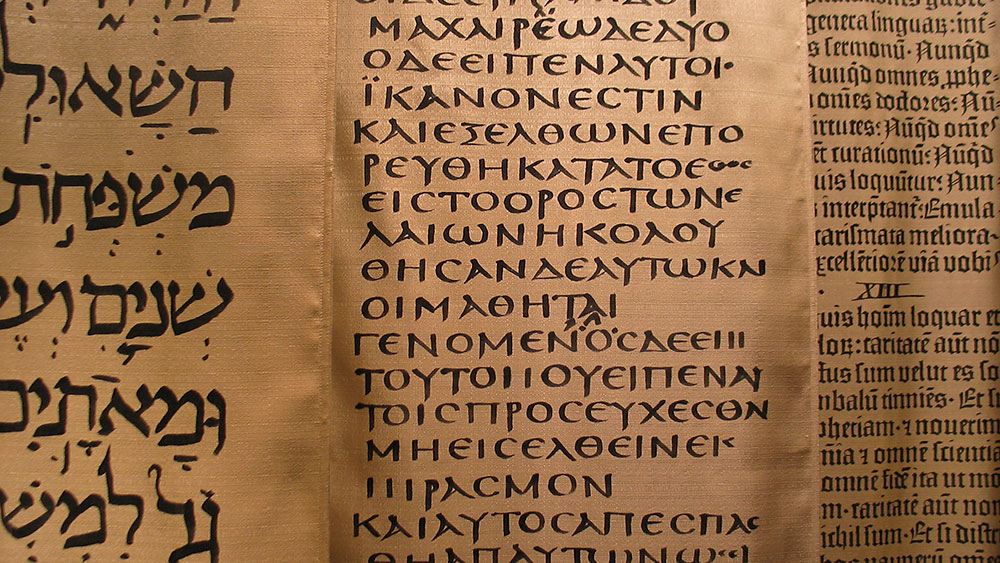
According to Benet, these words should have been translated to either cannabis or hemp, instead of “sweet calamus” and “sweet cane”.
All subsequent translations of the Bible relied on the Septuagint, and therefore the incorrect translation endured to this day.
How many times is marijuana mentioned in the Bible?
If we acknowledge the mistranslation theory proposed by Benet, we’ll find that cannabis is mentioned five times in the Bible, with three different words, all of which have the same root word (kan).
The usage of different words can be explained by the passage of time, because the Old Testament covers approximately one thousand years.
Where is marijuana in the Bible?
All of the potential mentions of marijuana are located in the Old Testament.
Cannabis appears in:
- The Book of Exodus
- The Song of Songs
- The Book of Isaiah
- The Book of Jeremiah
- The Book of Ezekiel
Which verse in the Bible talks about marijuana?
The first mention, Book of Exodus, 30:23-25 – 1446 BCE
The first time cannabis makes an appearance in the Bible is when the prophet Moses receives a message from God, who gives him precise instructions on how to set up the Tabernacle (a portable place of worship), and also how to make a holy anointing oil, which presumably contained cannabis.
This oil was used to bless both the temple and the priests.
“Then the Lord said to Moses, ‘Take the following fine spices: 500 shekels of liquid myrrh, half as much of fragrant cinnamon, 250 shekels of fragrant calamus (cannabis), 500 shekels of cassia – all according to the sanctuary shekel – and a hin of olive oil.
Make these into a sacred anointing oil, a fragrant blend, the work of a perfumer. It will be the sacred anointing oil.’”
Here are the ancient measurements converted:
- Liquid myrrh 500 shekels – 5.75 kg (12.68 lbs)
- Cassia 500 shekels – 5.75 kg (12.68 lbs)
- Cinnamon leaf 250 shekels – 2.87 kg (6.34 lbs)
- Cannabis 250 shekels – 2.87 kg (6.34 lbs)
- Olive oil 1 hin – 6.5 liters (1.72 gallons)
If these were in fact real cannabis flowers used for the preparation of this oil, then this mixture would be highly psychoactive, if we consider the amount of cannabis and the amount of olive oil used in the process.
These ceremonies would include pouring of the sacred oil on both the priests and the temple , which would undoubtedly create powerful mind-altering effects.
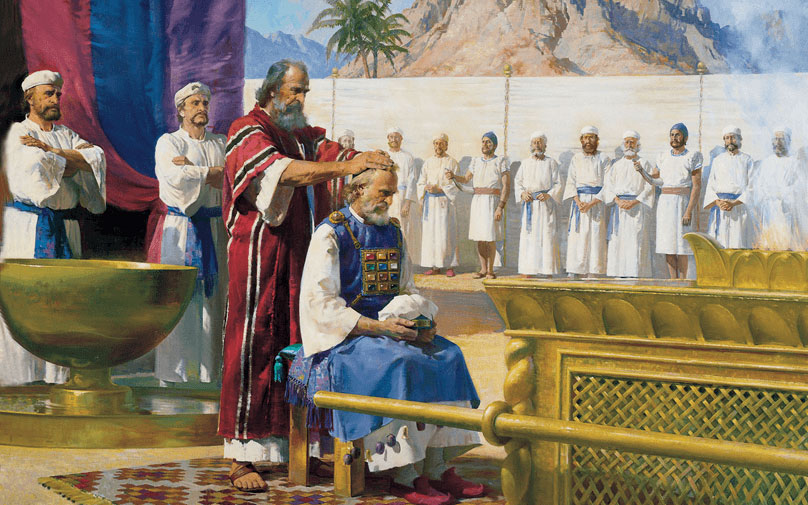
The second mention, Song of Songs 4:10-15, 950 BCE
The second time cannabis is mentioned in the Old Testament occurs several centuries later, in a love poem, written for his wife by the famed King Solomon (under whom the Solomon’s Temple was erected).
Solomon’s father was King David, who slayed the giant Goliath in single combat.
This poem is considered as one of the most beautiful segments of the Bible, and what’s quite unusual about it is the sexuality of King Solomon’s words.
“How delightful is your love, my sister, my bride! How much more pleasing is your love than wine, and the fragrance of your perfume more than any spice! Your lips drop sweetness as the honeycomb, my bride; milk and honey are under your tongue. The fragrance of your garments is like the fragrance of Lebanon. You are a garden locked up, my sister, my bride; you are a spring enclosed, a sealed fountain.
Your breasts are like two fawns, like twin fawns of a gazelle that browse among the lilies. Until the day breaks and the shadows flee, I will go to the mountain of myrrh and to the hill of incense. You are altogether beautiful, my darling; there is no flaw in you.
Your plants are an orchard of pomegranates with choice fruits, with henna and nard, nard and saffron, calamus (cannabis) and cinnamon, with every kind of incense tree, with myrrh and aloes and all the finest spices. You are a garden fountain, a well of flowing water streaming down from Lebanon.”
The third mention, Book of Isaiah 43:24, 711 BCE
The third mention is from the book of Isaiah, who was also a prophet of the Lord, just like Moses.
Isaiah was trying to lift the spirits of his fellow Israelites, preaching that they lost their way, and became immoral and faithless.
In this particular passage God is angry at his people, because they failed to deliver him his offerings, and it seems that cannabis was one of them.
“You have not bought any fragrant calamus (cannabis) for me, or lavished on me the fat of your sacrifices. But you have burdened me with your sins and wearied me with your offenses.”
The forth mention, Book of Jeremiah 6:20, 627 BCE
Jeremiah was known as the weeping prophet, who envisioned the upcoming destruction of Israel.
In the book of Jeremiah, cannabis is mentioned as a commodity that God no longer requires, marking a decisive change in the way Isrealites worship their deity.
In this passage, God is furious at his people, because of their sinful behaviour.
“What do I care about incense from Sheba or sweet calamus (cannabis) from a distant land? Your burnt offerings are not acceptable; your sacrifices do not please me.”
The fifth mention, Book of Ezekiel 27:19-19, 586 BCE
In 586, Jerusalem fell and the Isrealites were banished to Babylon.
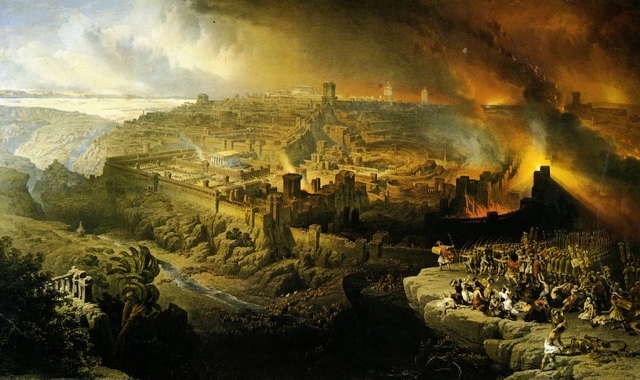
This was a devastating event for the Jewish people, and the prophet Ezekiel spent the remainder of his life in exile.
In the last Biblical reference to cannabis, the plant is mentioned as one of the trade items that passed through Tyre (located in modern Lebanon), which was the thriving capital of the Semitic-speaking region, Canaan.
“Damascus did business with you because of your many products and great wealth of goods. They offered wine from Helbon, wool from Zahar and casks of wine from Izal in exchange for your wares: wrought iron, cassia and calamus (cannabis).”
This sums up all of the potential references to cannabis in the Bible.
As you had a chance to see, cannabis had several different purposes in those days, ranging from ceremonial and ritualistic use, to a trading commodity, and was even used as a metaphor to describe the beauty of Solomon’s wife.
Where in the Bible does it say marijuana is a sin?
There are no passages in the Bible that mention the use of cannabis as something sinful, but there are two important factors to consider, and they are pretty conflicted.
The holy scripture mentions several times that all plants on God’s green Earth were created for consumption.
This is evident in Genesis 1:12, Ezekiel 34:29 and Revelation 22:2.
“The land produced vegetation: plants bearing seed according to their kinds and trees bearing fruit with seed in it according to their kinds. And God saw that it was good.”
“I will provide for them a land renowned for its crops, and they will no longer be victims of famine in the land or bear the scorn of the nations.”
“Down the middle of the great street of the city. On each side of the river stood the tree of life, bearing twelve crops of fruit, yielding its fruit every month. And the leaves of the tree are for the healing of the nations.”
Despite that, the Bible denounces all forms of intoxication and mind-alteration, so the psychoactivity caused by cannabis would probably be deemed as a sin.
This is evident in the following paragraphs:
Ephesians 5:18 – “Do not get drunk on wine, which leads to debauchery. Instead, be filled with the Spirit.”
Galatians 5:21 – “Envy, drunkenness, orgies, and things like these. I warn you, as I warned you before, that those who do such things will not inherit the kingdom of God.”
Romans 13:13 – “Let us behave decently, as in the daytime, not in carousing and drunkenness, not in sexual immorality and debauchery, not in dissension and jealousy.”
Habakkuk 2:15 – “Woe to him who gives drink to his neighbors, pouring it from the wineskin till they are drunk, so that he can gaze on their naked bodies!”
As you can see, the Bible’s references to getting drunk are closely related to orgies and “sexual immorality”, which is extremely frowned upon. But since all plants are God’s gift to humanity, and since there is no reference to this particular plant increasing sexual appetites, getting high from cannabis could perhaps be considered a gray zone.
Is medical marijuana in the Bible?
I found no evidence that would suggest cannabis was used for medicinal purposes in Biblical times.
The mentions described above show that it was used for ceremonial and ritualistic reasons, and served as a trading commodity.
Is smoking marijuana in the Bible?
In these five mentions, there is not a single suggestion that cannabis was consumed through the means of combustion.
The Biblical texts suggest that it was mainly used for the creation of oil, which is definitely a healthier way to get cannabinoids into your system.
Conclusion
Even though the topic of marijuana in the Bible is highly anecdotal and open for interpretation, it is not unrealistic to assume that cannabis was consumed in those times.
There is a ton of evidence which shows that cannabis was used in both ancient China and India, so why not in Southwestern Asia? If you’d like to know more about the use of cannabis through history, check out these articles:
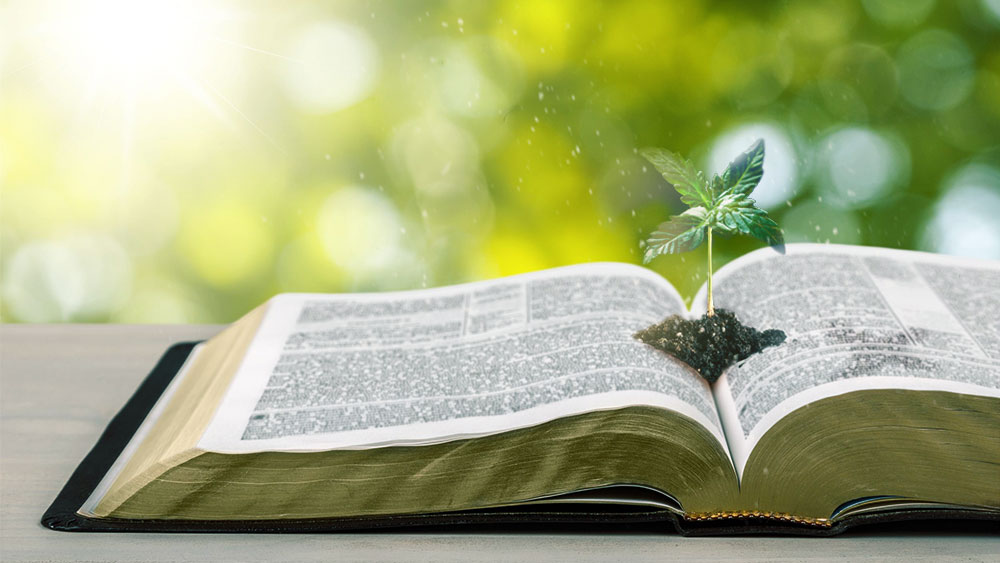

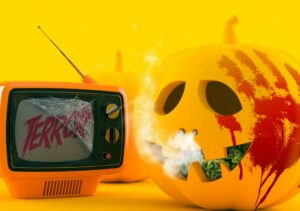

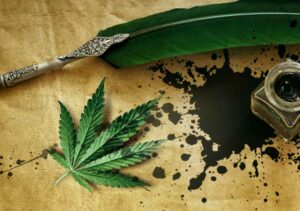
John Martinez July 1, 2020 at 12:23 pm
The psychoactive effects of cannabis are not activated until the plant is heated, as in cooking or smoking it. There is no evidence the Israelites cooked or smoked the anointing oil, it was poured on the person's head, raw and uncooked. However, even if it was cooked (which it wasn't), There would still be no psychoactive effects as a result of coming in contact with the oil, since the THC wouldn't be absorbed into the blood stream via the skin / scalp. Moreover, they didn't pour the oil into the person's eyes, that would hurt and render the person blind. Pouring oil into one's eyes, is not a good idea and they were smart enough back then to figure that out.
Al August 14, 2020 at 1:52 am
False. The used it as the burnt offering as is clearly known if you read the full passages in question. This burning was done inside the tabernacle, a very enclosed space with a cap ton of people inside. You need to look up the measurements. MANY ounces of Cannabis mixed with comparable quantities of the other plants mentioned, and all of this suspended in only a Hin of olive oil. A hin is almost exactly the same as a standard quarter gallon. A quart. Only a quart of olive oil for pounds of total material. In other words... this was a resin for vaporization, which is exactly what they did. Just like the scythians.
melissa December 1, 2020 at 2:20 pm
THC is absorbed by the skin, the body's largest organ. Also, the oil would not blind you. Irritate, yes, but not blind. Also, burn pyres have been found with THC residue in them.
Erin Gibson July 20, 2020 at 11:05 pm
Yes, and the Bible also says "Drunkenness is a SIN" That applies to all intoxication. Bible wants you to make rational thinking, not altered. Now. Cannabis, is no longer a natural product. It would never grow in nature in the current forms of concentration. It can never grow in its modern concentrations. It has to have unnatural light and light hours, and over fertilization. That's because the cultivators of this psychosis have GMO'd it more that any plant on the face of this earth, just to find the most concentrated way to mess up their minds. That's their goal. These same people are the kind that want all organic, non GMO products. yet modern dope for dopes is the most genetically engineered product on the face of the earth, simply to mess up their natural way of thinking just to get sickly high.
Melissa December 1, 2020 at 2:22 pm
the joke is on them. it is a marketing gimmick. higher percentages of THC does not equal getting "higher." that is a false belief held by many.
Patrick cox May 18, 2021 at 8:17 pm
I dont think drunkeness applies to all intoxication...you constantly see alcohol looked down on and referred to as drunkeness but you dont see that word uses with using any plants or other substances anywhere else...it seems drunkeness was only used in reference to alcohol which makes sense bc it's the one thing that makes ppl not know what they are doing
YYY February 12, 2022 at 11:16 pm
True, someone else takes over the wheel with alcohol, while with cannabis, one's senses get even more amplified. Cannabis is an amplifier, while alcohol is a numbing, dumbing agent. Two contrary effects.
Regina Braden June 6, 2022 at 5:57 pm
Exactly
Norma Matthews August 30, 2020 at 5:07 am
I would like to no more
RAY CRITCHER December 16, 2020 at 12:46 am
CALAMUS WAS WRONGLY TRANSLATED IT IS TWO WORDS CALA MUS OR CAL AMUS This is a sweet flag plant not Majuana I looked it up on google
Warrior January 24, 2021 at 3:05 am
Yeah, google issoooooo accurate....🙄
Patrick cox May 18, 2021 at 8:13 pm
Your not understanding...the original translation was supposed to be translated to cannibus...not calamus.. So yes calamus does mean sweet plant but thats not what the original version was meant to be...it was supposed to be cannibus
Templul Cannabisului December 19, 2020 at 2:45 pm
It's all true. Cannabis is KANEH BOSEM. There is a documentary on youtube called "cannabis in the old testament". And in 2020 there is an ARCHEOLOGICAL evidence that priests used to burn cannabis as part of the religious ritual. Just search on Google for Tel Arad Temple, Israel marijuana.
Cyril Cooper May 24, 2021 at 11:23 pm
Sex isn't a Sin but, Fornication & Adultery are. Looking at one's wife with Desire isn't Sin but, looking upon another woman with Desire is Lust. Drinking Wine isn't a Sin but, Drunkenness is. Eating isn't a Sin but, Gluttony is. Pharmakia is: Drugs derived from Poisonous roots & plants, which either Poison or Drunken a patient. From years & years of personal experience, SMOKING Pot may cause Drunkeness, when in Excess .. but, Ingesting Cannabis Oil allows one to maintain Soundness of Mind! It's Medicinal .. Not Intoxicating!! Self-Controll, Temperance & Moderation are Fruit Of The Spirit!!!
Carl June 11, 2021 at 1:53 am
Seek and ye shall find. Weed is helpful in getting into Scripture. Don’t party; drink some coffee, burn a heady sativa, and inquire of the 1611. We are seeking a kingdom. If you already know the Bible, think of it from a Hyksos perspective. Be True.
Carl June 11, 2021 at 1:55 am
A water and weed 72 hour fast with lots of Bible... it can recalibrate.
YYY February 12, 2022 at 11:23 pm
Yahawah told me that cannabis oil is a meditative, contemplative, amplifying, medicinal plant that opens our senses to the spiritual world, and if He is in us through our trust and faith in His son's sacrifice on the cross, then what we experience and should experience more of when we imbibe of this plant is HIM! It is a blessing that has been kept from us for a long time, and something each of us should have peace with Our Creator about before partaking. Since it is not a no-no in the Bible, then it is something our conscience towards our Creator should render sinful or not.